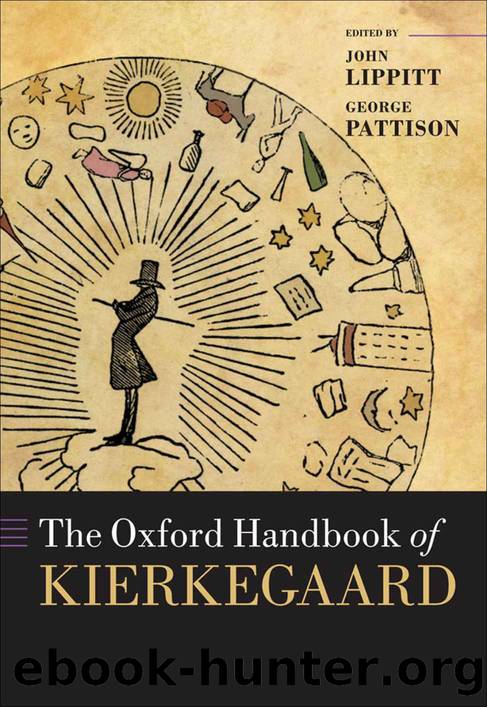The Oxford Handbook of Kierkegaard by John Lippitt & George Pattison

Author:John Lippitt & George Pattison [Lippitt, John & Pattison, George]
Language: eng
Format: epub
Tags: Historical, Non-Fiction, Philosophy, Theology
ISBN: 9780198709794
Amazon: B00B7LPQ8C
Publisher: OUP Oxford
Published: 2013-01-30T00:00:00+00:00
III. FEAR AND TREMBLING
In two long letters from the Judge to A, Volume Two of Either/Or contains a critique of the aesthetic stage from the point of view of the ethical that lasts more than three hundred pages. The brief sermon is the hint of a critique of the ethical from the point of view of the religious. To elaborate on that hint is the task of Fear and Trembling. Once again a stage or existence sphere is presented concretely in an individual representative, in this case Abraham. His faith, especially as exhibited in the Genesis 22 story of the near sacrifice of Isaac, represents a âteleological suspension of the ethicalâ. In other words, biblical faith is irreducible to the ethical, to conformity with the laws and customs of oneâs people. The voice of the people is not necessarily the voice of God.
There are two mistakes to be avoided in exploring this text. The first is to think that Fear and Trembling represents Kierkegaardâs ethics. For that we would need to turn to Works of Love and other works of his so-called âsecond-authorshipâ. What is at issue is the ethical stage or sphere, regardless of its particular content, rules, virtues, etc.
The second mistake to avoid is to think that the ethical is to be understood along generally Platonic or Kantian lines. It is easy to fall into this trap since Johannes de silentio (the pseudonymous author) calls the ethical the universal. This all too easily suggests the world of Platoâs forms or Kantâs highest principle, the categorical imperative, and thereby an existence sphere grounded in pure reason, historically and socially unsituated. But Silentio goes out of his way to make it clear three times over that the ethical is to be understood along Hegelian lines, just as it was in Either/Or. The universal is some concrete community, not some abstract principle.
In the first place, the three problems that make up most of the text, all begin in the same way: if the universal is the highest, then Hegel is right, but Abraham is lost (SKS4: 148â9, 160â1, 172â3/FT: 54â5, 68â6, 82). Abraham represents the suspension of the Hegelian universal. Secondly, Silentio uses the Danish phrase that is equivalent to Hegelâs Sittlichkeit (det sædelige, Sædelighed [SKS4: 149/FT: 55, n.7]). Thirdly, he gives five examples of the ethical universal: the nation, the state, society, the church, and the sect (SKS4: 153, 155, 166, 170/FT: 59, 62, 74, 79). In Hegelian fashion, the ethical is the universal not by being a form or principle one might discover and follow but by being a community to which the individual belongs as a member. This means that the universal is not quite universal, since there are as many different universals as there are different societies and cultures. Only the historically integrated totality of these mini-universals is genuinely universal. The ethical stage is that mode of being-in-the-world that effectively takes the laws and customs of oneâs own people (paradoxically a particular universal) to be the highest criterion for oneâs life.
Download
This site does not store any files on its server. We only index and link to content provided by other sites. Please contact the content providers to delete copyright contents if any and email us, we'll remove relevant links or contents immediately.
The remains of the day by Kazuo Ishiguro(8999)
Tools of Titans by Timothy Ferriss(8394)
Giovanni's Room by James Baldwin(7346)
The Black Swan by Nassim Nicholas Taleb(7129)
Inner Engineering: A Yogi's Guide to Joy by Sadhguru(6794)
The Way of Zen by Alan W. Watts(6614)
The Power of Now: A Guide to Spiritual Enlightenment by Eckhart Tolle(5781)
Asking the Right Questions: A Guide to Critical Thinking by M. Neil Browne & Stuart M. Keeley(5775)
The Six Wives Of Henry VIII (WOMEN IN HISTORY) by Fraser Antonia(5515)
Astrophysics for People in a Hurry by Neil DeGrasse Tyson(5189)
Housekeeping by Marilynne Robinson(4447)
12 Rules for Life by Jordan B. Peterson(4304)
Ikigai by Héctor García & Francesc Miralles(4274)
Double Down (Diary of a Wimpy Kid Book 11) by Jeff Kinney(4272)
The Ethical Slut by Janet W. Hardy(4251)
Skin in the Game by Nassim Nicholas Taleb(4248)
The Art of Happiness by The Dalai Lama(4130)
Skin in the Game: Hidden Asymmetries in Daily Life by Nassim Nicholas Taleb(4006)
Walking by Henry David Thoreau(3962)
